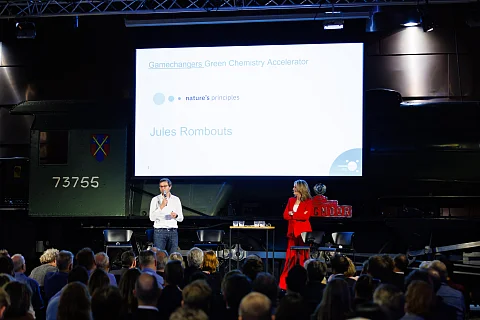Gamechangers on Stage and in the Lead
08-11-2023
Innovative startups often falter in the so-called "valley of death" before they can grow into established companies, primarily due to a lack of funding and experience. Together with Invest-NL and the Regional Development Agencies (ROMs), GCNE has launched the Green Chemistry Accelerator program to assist startups in scaling up to become fully-fledged businesses.
The support program encourages startups to build pilot factories, enter the market, and ultimately produce hundreds of tons of raw materials for biobased plastics. Last year, five green startups participated in the program, and this year, another five companies have been selected. "These game-changers bring the energy, hope, and confidence in the future that we can succeed together and truly make a difference in the circular process industry," said chairman of the day, Simone van Trier.
Solving and purifying plastic waste
The five startups began the program in October. Resolved Technologies aims to enhance the quality of recyclate by dissolving low-quality plastic waste in a solvent. This new technique removes impurities, recovering only pure polymer. The startup is constructing a pilot factory in Geleen and aims to have a demo factory operational by the end of 2025 that will produce 10,000 tons per year.

Recell extracts cellulose from unused residual streams that are currently burned to produce glucose, bioplastics, and bio-ethanol. The startup has a production system with a capacity of 100 tons per year and aims to scale this up to 100,000 tons.
New biodegradable polyester for clothing
DOPS Recycling Technologies is developing and selling gasification technology to create syngas from waste and biomass that are currently burned or landfilled, intended for the chemical industry. The current pilot factory produces 5 cubic meters of syngas per hour. The new demo factory is expected to produce 500,000 cubic meters per year by 2025 and even reach 3 million cubic meters later.
The technology company Senbis - the former R&D department of Akzo Fibers - develops biodegradable plastics used in products such as ropes, nets, and containers for agriculture and fishing. Senbis has just started a large project to develop a new type of biodegradable polyester for clothing, one of the largest sources of plastic pollution in nature.
Hundreds of millions needed
The long journey that startups must undertake is illustrated by a company like Avantium. A pioneer in green chemistry that produces PEF, a completely plant-based, recyclable new plastic material suitable for use in bottles, packaging, and textiles. Tom van Aken became CEO of Avantium in 2005, and only now is the company beginning to build its first factory in Delfzijl. "One thing is certain: you really need to have perseverance to achieve this and maintain it," he says. "For this factory alone, we have raised 192 million euros in capital, and over the past few years, about 500 million has been invested to get to this point." Van Aken spent half of his time securing investors, grants, and funds. In 2017, Avantium went public to attract more capital. The company was also able to borrow 90 million euros from four Dutch banks and Invest-NL. "This is proof that it can be done. Now we need to ensure that it happens much more often," says Van Aken.


